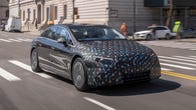Mercedes-Benz is going all in on electric vehicles.
Antuan Goodwin/Roadshow
The automotive industry is in the midst of a tectonic change as manufacturers shift from internal combustion to electric propulsion. The latest company to announce its future roadmap is Mercedes-Benz. On Thursday, the German giant unveiled its electrification strategy through the end of this decade, which includes three new all-electric vehicle architectures, more research and development spending, new partnerships and more.
In markets where this shift is feasible, Mercedes-Benz is aiming to go all-electric by the end of this decade. An important step on the road to a battery-powered future, by 2022 the automaker plans to offer EVs in every vehicle segment it competes in. Then, from 2025 forward, every new product architecture will be electric-only, giving drivers a battery-powered option for every Mercedes-Benz vehicle.
To achieve these lofty goals, Mercedes-Benz is investing more than 40 billion euros ($48 billion) between 2022 and 2030. This outlay will increase the company’s research and development significantly. Speaking of financials, during a video presentation, Ola Källenius, CEO of Daimler AG and Mercedes-Benz AG, said this is the company’s “most significant reallocation of capital in decades” as it accelerates from an EV-first to an EV-only strategy. For the automaker, this monumental change should not impact the bottom line. To grow per-unit net revenue, the company is pushing for greater sales of high-end EVs, products from its Mercedes-Maybach and Mercedes-AMG sub-brands. “Mercedes-Benz is laser-focused on profitable growth,” said Källenius.
Supporting these lofty electrification goals, three new modular, scalable vehicle architectures will be introduced in 2025. These electric-only platforms include MB.EA, which will support medium and large passenger cars; AMG.EA, a high-performance platform for driver-oriented cars; and VAN.EA, tailored for light commercial vehicles. In addition to other architectures, these three new offerings should give the company a platform for every segment it competes in.
Like other automakers, Mercedes-Benz is looking to vertically integrate its electric-powertrain development. To this end, the company acquired YASA, a UK-based firm that makes electric motors. Mercedes will now have access to “axial flux” technology, which will help it develop ultra-high-performance vehicles.
The EQS is Mercedes-Benz’s new flagship-caliber all-electric sedan.
Mercedes-Benz
On the battery front, Mercedes-Benz will need a lot of cells as it transitions to an electrified future. Like, a lot. To deliver, the automaker (along with partner companies) plans to have up to eight factories around the world producing batteries for electric cars. These facilities are in addition to the nine battery systems plants it already had planned. Future batteries will also be standardized so they can be used in 90% of the company’s upcoming vehicles. Mercedes-Benz’s next-generation cell designs will have silicon-carbon composite anodes, providing longer range and shorter charging times. The automaker is also looking to develop solid-state battery technology and is in talks with outside companies.
Making it easier to live with an electric vehicle, Mercedes-Benz is working on something called Plug & Charge, which allows you to recharge an EV without authenticating or having to process a credit-card payment. Just plug in and everything happens seamlessly. The company’s Me Charge network is aiming to be the largest in the US, with some 60,000 charging points. An expansive network like this will be a necessity if every new Mercedes-Benz is going to be electric in the next few years.
To prove the efficiency of electric vehicles, engineers are developing a car with a real-world range of more than 1,000 kilometers (621 miles) and with an efficiency of more than 6 miles per kWh when driven at highway speeds. The Vision EQXX, expected to debut in 2022, will be a technological tour de force, but engineers are not taking a sledgehammer approach. Anyone could put a massive battery in a vehicle and get a commensurately mammoth range number, but the Vision EQXX will feature a normal-sized battery, relying instead on extraordinary aerodynamics, vehicle-wide efficiency improvements and cells with 20% greater energy density to deliver that 1,000-km target.
Carbon-neutral production is on the horizon, too. For its vehicle- and battery-assembly sites, Mercedes-Benz expects to reach this goal by 2022. The automaker will also build a new battery recycling facility in Germany, where it will develop recycling expertise and capacity. This plant is expected to start operating in 2023, pending the approval of authorities.
Mercedes-Benz is pushing forward to an all-electric future and expects electric vehicles to account for 50% of its sales by 2025. This sounds like an ambitious goal, but company executives seem optimistic. “Mercedes will stay in the fast lane,” Källenius said.
2022 Mercedes-Benz EQS Edition One is a flashy, techy electric flagship
See all photos

